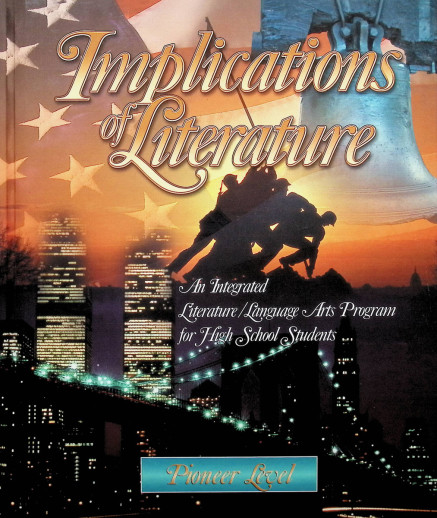We use cookies to make your experience better. To comply with the new e-Privacy directive, we need to ask for your consent to set the cookies. Learn more.
Pioneer Student's Edition (Implications of Literature)
This course offers literature spanning 500 years of American writers (primarily western Europe and North America) and genres. Each of the 7 units focuses on a different literary theme: short story; poetry; narrative or objective writing; biography; autobiography; nonfiction; drama; and a unit including primary source documents from significant political events. Composition assignments include narrative, literary analysis, personal or reflective, persuasive, comparison/contrast, cause and effect, and descriptive essays. Two major works are included: Bartleby the Scrivener, and the play, The Andersonville Trial. Difficult subjects are not ignored, including the Influenza epidemic of 1918, the death of Abraham Lincoln, as well as Hitler’s plans for Canada and the US. The end of the text is filled with writing handbooks of comprehension and writing skills; folklore; nonfiction writings; and a manual of style, grammar, usage, and mechanics which provides help but does not include writing instruction. The Teacher’s text is necessary. 1 credit course. ©2001, Nonconsumable, 888 pgs, sewn bindings, hc. ~ Ruth
In preparation for standardized tests and proficiency examinations, the Pioneer Level encourages upper-level students to sharpen their critical thinking skills, distinguish literary themes, and recognize differing viewpoints. These abilities foster the clarity of written expression so critical for success in the newly-formatted SAT examinations.
An introductory 16-page Overview that offers students a synopsis of the events that ultimately led to the development of the United States as we know it today. The Overview encompasses a span of 500 years, enabling readers to gain a deeper understanding of the impact of history on the literature produced during those years of growth, conflict, exploration, and development. Handbooks at the conclusion of the text reinforce writing and language-arts skills.
Well-written literature is a treasure to engage with and learn from! This curriculum gives both teacher and student the tools and confidence to do so. Reading selections are grouped by genre into units, with each unit further organized by themes such as humanity, courage, philosophy, perseverance, and injustice. The literature choices reflect excellent, time-honored works which emphasize morals (either by highlighting the positive or contrasting with a negative theme). Prior to each reading selection, Before You Read sections will help students learn about the author and the selection, clueing in to specific literary techniques to look for as they read. Pages are lined with reading questions, helpful definitions, CheckQuizzes, and Vocabulary Workshops (with vocabulary practice). Following each selection are Literary Critiques (to analyze a passage); literary “FYI’s” (to understand literary context); Writing Workshops (to apply analysis skills); and more. Journal Workshop sections allow students to flesh out ideas and practice writing skills. Text sidebars provide introductory information, discussion questions, helpful definitions, and key points. Students engage critical thinking skills in their discussions and writing assignments (including essays, journaling, and literature responses). Detailed writing handbooks provided at the end of each text serve as guides for the assignments, but texts do not include writing instruction.
The 9-12 course sequence follows a bit of an atypical pattern. The first three levels are organized by genre while teaching students to respond to literature from different cultures and time periods. The Ninth grade Explorer (World Literature) includes a 46-page Shakespeare unit and the novel Around the World in Eighty Days. The Navigator Level (Grade 10) highlights diverse international literature and includes the full text of A Tale of Two Cities. It also assigns narrative, descriptive, expository, and persuasive writing as well as literary analysis. Pioneer (11) dials in on American Literature with primary source documents, classics and includes the full text of the novel, Bartleby the Scrivener. Writing assignments will include narrative, literary analysis, personal, persuasive, and descriptive writing. The final level, Trailblazer (12), spans British Literature from 449 AD to the 20th century. Selections in this volume are arranged by historical and literary periods (Medieval, Victorian, etc.) and include the full text of Macbeth. For specific details on each level, see our individual product descriptions.
Student Texts include literature excerpts and some full texts, including short stories, essays, drama, poetry, or novellas. Hard topics are not ignored: the Auschwitz trials; living as slaves; the effects of aging or communism, etc. Students are encouraged to ponder and respond to these concepts. While no religious instruction is included, religious terms and writings have historically been a part of culture and typical daily life. So, there may be religious references, for example, in a volume containing Renaissance literature, but will not be examined from a religious instructional viewpoint. This neutral curriculum is also recommended by the Association of Christian Schools International (ACSI).
The traditional style Teacher Books (10x11”) include reduced student pages with questions/answers and teacher support. This support includes vocabulary enrichment, literary terms, writing techniques, a manual of style, detailed alphabetized listing of readings, indices of writing tasks, focal themes, authors and literary works, and glossary. Periodic Literature CheckQuizzes provide a way to examine student’s reading. These texts also provide information to help students prepare for the NY Regents’ examination. While this is a New-York specific test and the information is dated (early 2,000’s), this test prep material will be helpful for preparing students for other English testing situations and could serve as a final exam for your course. Answers and model essays are provided in the Teacher’s Book. Each course is considered 1-credit. ~ Ruth
| Product Format: | Hardcover |
|---|---|
| Brand: | Textword Press |
| Grade: | 11 |
| ISBN: | 9781930592049 |
| Length in Inches: | 10.3125 |
| Width in Inches: | 8.75 |
| Height in Inches: | 1.625 |
| Weight in Pounds: | 5.5 |

